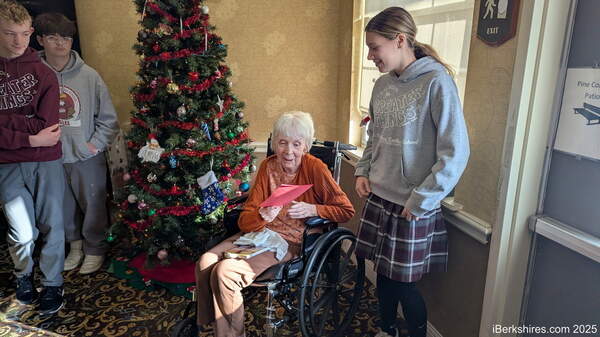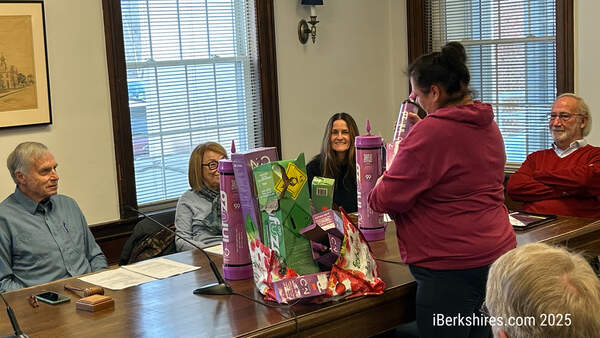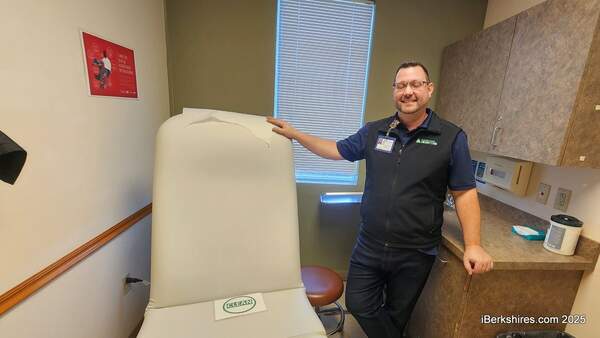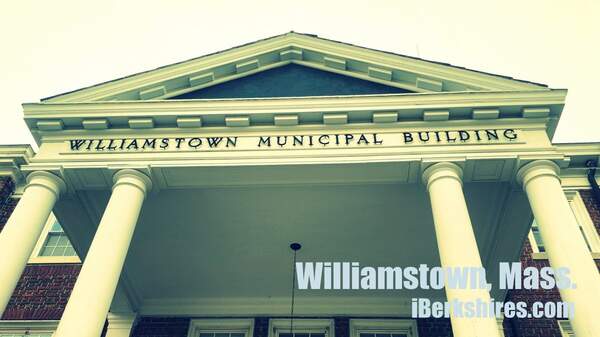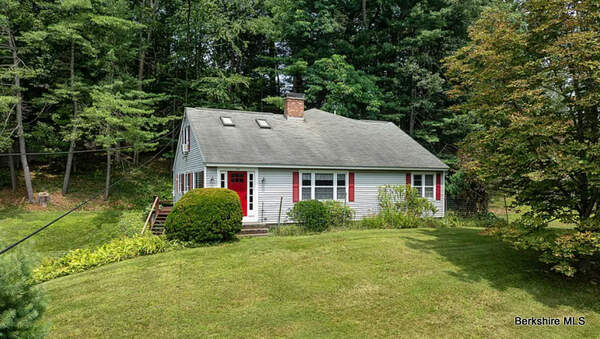Donati Takes Cautious Approach in Williamstown Race
 The annual town election is Tuesday, May 12, from 7 a.m. to 8 p.m. in the elementary school gymnasium.
The annual town election is Tuesday, May 12, from 7 a.m. to 8 p.m. in the elementary school gymnasium.
There are four candidates vying for the open seat being vacated by Thomas Sheldon. This is one of four interviews with the candidates; the others are Anne O'Connor, Alison O'Grady and Jack Nogueira.
There are three candidates running for two open seats on the Elementary School Committee.
WILLIAMSTOWN, Mass. — Martino Donati wants to be a selectman who listens to townspeople and takes on issues as they come.
He does not see himself as a crusader looking to make big changes in town government.
"Some people feel that the role is to bring their ideas and guide the town, and I don't really see it that way," Donati said this week. "There are lots of people around town who have a lot of good ideas, and it's more shepherding those ideas and coordinating those ideas and balancing different interests."
Donati is one of four candidates for one vacant seat on the Board of Selectmen. On Tuesday, May 12, from 7 a.m. to 8 p.m., voters will choose a winner from among that slate and fill two vacant positions on the Williamstown Elementary School Committee.
This week, iBerkshires.com sat down with each of the candidates to talk about his or her campaign and vision for the Village Beautiful. The first in a series of conversations — Donati's — appears here:
Q: So how is the campaign going?
A: People mostly don't have real issues, I would say, overall. There are a couple of things people are concerned about, like how the school project is going to work out.
I've been asked about fiber optic cable and the last mile problem in town and whether it's worth the town addressing that. And certainly for the types of businesses I think would do well in town that's something to continue looking into.
I've just started researching it, and so far it's looking to me like it's not a town thing to pursue. It's something that's going to be driven by the number of subscribers. It would certainly benefit the schools.
Q: Speaking of the schools, you mention the Mount Greylock building project. What role do you see the select board playing in that?
A: I think that's sort of the cheerleading role of the selectmen. I don't see the selectmen so much as driving policy as corralling people's ideas and focusing them.
I think there's a lot of interest in town to have something happen with the school. Certainly, every time I go to Mount Greylock in the winter, I see money floating off the roof and out the doors with all the heat being lost. I think it's going to be a big upfront cost, but I don't think it will be very long before it pays for itself.
Q: But obviously, that's going to be a region vote. The School District will bring that to a vote on its own, so the Select Board would be making more or less an advisory vote.
A: Sure.
Unless something were to happen and it was no longer a regional district. I really hope that doesn't happen. I want us to stay with Lanesborough. ... But if it does and Williamstown winds up on its own, then the select board would play more of a role, I think. But we certainly hope it doesn't happen.
Q: The Selectmen will be asked to make an advisory vote on the building project. It could also be asked to make an advisory vote on expanded regionalization for Mount Greylock. Have you thought much about that?
A: It does seem there are cost savings with that, too. And it's better educationally to have the superintendent who is overseeing the school [students] are going to end up in helping to direct policy in both of the feeder schools. That just makes sense, so the kids have similar paths to get to the middle school.
I think there are cost savings for the administration to do that.
Q: How do you feel about the economic development issue?
A: It's a tough balancing act because some people really want to go all out pro business and try to attract business. I think we're going to have limited success with that. What Williamstown can do well is be attractive and have people carve out niches here.
There are well-educated people who come here for the school, for the environment, Williams alums, who just want to live here. They're not going to come here because it's such an attractive place for business. They're going to come here because it's an attractive place.
Q: Do you see Williamstown as more of a bedroom community?
A: The other side of that balancing act is to not make it difficult for business to be here. Sometimes we do.
We could make it easier by instead of the town being a policeman being more of a cheerleader. For instance, with the farm at Five Corners with their playground, not that that's what collapsed the place, but ... we should have our building inspector go coach people and see how they can make it work.
Instead, you go and sit in front of a committee and explain yourself and say how you're going to fit into our plan instead of us trying to work with your plan.
If there is some way for us to be more business friendly, that's something to pursue aggressively. But I don't think we're going to be a magnet for business.
It's possible some business could come to town and bring some jobs, but I don't think that is going to be what drives the maintenance of Williamstown.
Something we do want to do is avoid continuing to lose our population.
Q: But without jobs ...?
A: There is the bedroom community kind of thing. Or if you look at [Williams College's] 'trailing spouse' problem, I think people have to accept that largely they're going to have to carve out their niche either with the help of counselors at Williams or an economic development group in the town or they're going to have to travel.
Albany is not that far. We think of a ride to Pittsfield as this impossibly far trip, and if you think of being in Manhattan, you're not even across town. You have to rearrange your thinking to,' 'OK, it's an hour to Albany, but there's a really good job that I'm qualified for in Albany ... or in Pittsfield or Springfield.' That's far, but there are people who do that.
And if you're not so driven to travel that far, there are jobs around here but it's going to largely be supporting the college, the Clark or the tourism industry.
Q: At the League of Women Voters' forum, you said the reason you were running was that no one else was. ..
A: And it's a job that has to be done.
Q: Not to put words in your mouth, but it sounds like you're not really bringing your agenda to the position.
A: Right.
Peter Fohlin did many great things, but I think one of the most important things he did was bump up our credit rating to AA1. That makes everything else easier. If the cost of borrowing is lower, overall your costs will be more manageable. An important role of the Selectmen is not to mess that up.
There is money in Williamstown, but we don't have so much that we can throw it away, and you can't do everything at once. An important role is to be very careful with the town's money.
Q: To continue the question about you running because no one else is running: Now that there are four people running for one seat, do you still feel that way?
A: I'm very glad that there is a contested race. I think any of us would be competent. We would bring a little bit different flavors to the position.
Q: Do you have a position on the plastic bag bylaw that the town will be asked to vote on at Town Meeting?
A: I do think the Selectmen made the right recommendation to study it more carefully how best to manage our waste.
I'm very glad [the petitioners] did bring the issue to the front because it's making me think about my behavior. I never thought of it before. I still get a plastic bag here and here, but it's on my mind now and it wasn't before I saw this brought to the table.
It's very good in that way, and I think that's how it's going to change: peer pressure around town. ... It's incremental changes like that that will save the planet. But I think making these abrupt, Draconian regulations are not going to help businesses in town compete. They're going to make it more difficult.
And [the bylaw] is not going to affect the waste stream very much. As many people have pointed out, most of the plastic bags in Williamstown came from Stop & Shop and Walmart [in North Adams].
While it's a great idea, I think it needs to be thought through more carefully.
I was thinking of it like the minimum wage. I think overwhelmingly people in Williamstown would support the idea that a $15 per hour minimum wage is reasonable. But if Williamstown did it on its own, that would have all sorts of unintended consequences that may not be in Williamstown's best interest.
There are many issues like that where it's a town interest, but it's not something the town can legislate its way out of.
Q: Only Jack Nogueira in this race has experience on a town committee or board. Is that something that gave you any pause?
A: I've sat on plenty of committees in business, which I understand is quite different than a town, but there are similarities. Organizational behavior is involved. You need to reach out to different resources in town to get things done. Managing budgets. Formulating contract ideas and actual contracts. They're analogous when done with a business or a town, I have no doubt.
There are certainly rules I would need to adjust to. I don't know all the rules of the Open Meeting Law, for example. But I would learn.
Q: I was thinking more from the standpoint of understanding how other town committees operate before going into town government at this level.
A: I know there are many things that I don't know, but there are plenty of things, just from watching, that I do know, and I don't think the learning curve to join the Selectmen would be that steep.
Although, clearly there is a learning curve.
Tags: candidates, election 2015, Selectmen, town elections,

 The annual town election is Tuesday, May 12, from 7 a.m. to 8 p.m. in the elementary school gymnasium.
The annual town election is Tuesday, May 12, from 7 a.m. to 8 p.m. in the elementary school gymnasium.

